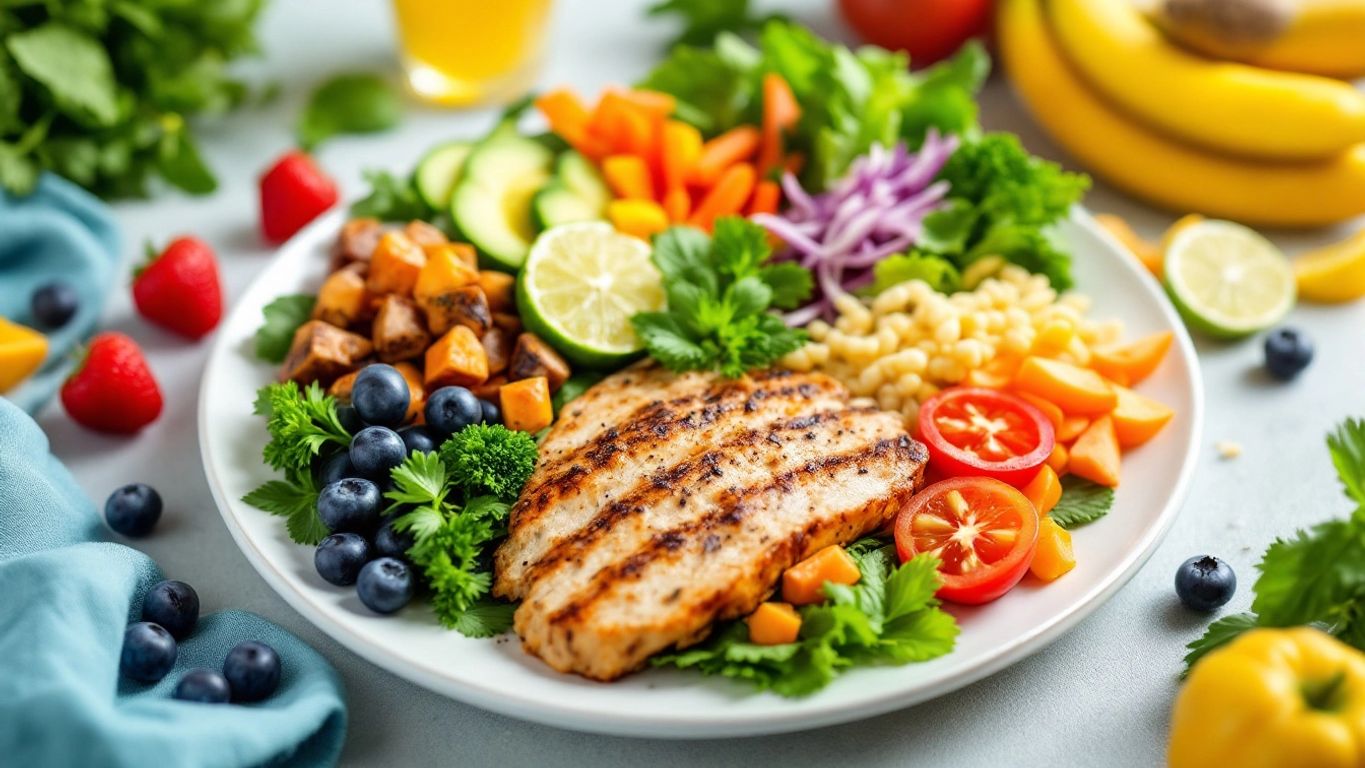Many women gain some weight unconsciously during the menopause. This can be frustrating, especially for those who are already making a lot of effort to maintain a healthy weight and keep the pounds off. Meal plans are becoming more and more popular in recent times as a way to lose weight tool. Menopausal diets can be used to help with losing weight during this period for those who think they are helpful. We’ll explore a five-day menopause diet today to try to lose some weight. We’ll explore more effective weight loss strategies for women who are experiencing menopause. Now let’s start rolling!
What is menopause?
There are many definitions of menopausal, based on the person who is being questioned. The majority of the time, menopause is thought of as the period that occurs following the end of a woman’s menstrual cycle. But, as per WebMD the period preceding is called menopausal and can last for up to four years.
After menopausal changes, the body produces less progesterone and estrogen (3). But, during perimenopausal the levels of estrogen and progesterone change dramatically.
Menopausal symptoms include as insomnia as well as irregular menstrual cycles or the hot flashes (3). It is also typical to notice weight growth. To get a better understanding of the ideal diet for menopausal women, we will examine the relationship between menopausal symptoms and weight growth.
Menopause Symptoms: Unveiling the Signs of Change
When you are experiencing symptoms, you may suffer from the following persistent symptoms.
- Irregular periods
- Dryness of the vagina
- Hot flashes
- Chills
- Night sweats
- Sleep problems
- The mood changes
- The weight gain and the slowed metabolism
- Dry skin and thin hair
- Breast fullness loss
Why Nutrition Matters During Menopause
To control obesity and menopausal symptoms, nutrition is important. The body begins retaining additional fat during menopause, especially around the abdomen, as estrogen levels drop. Chronic illnesses like heart disease and diabetes may become more likely as a result.
Women can keep their weight in check, lower their chance of developing specific illnesses, and help regulate their hormonal levels and metabolism by following a menopause diet plan that focuses on foods that are rich in nutrients.
Simple Dietary Suggestions to Support Menopause
Below are 5 foods for menopause that are a must to add to your diet.
- Calcium-rich foods: Boost bone strength with calcium-rich foods! As estrogen decreases, so does bone density, putting you at risk for osteoporosis. Get your calcium fix from dairy products, leafy greens, and fortified tofu to keep your bones healthy and strong.
- Omega-3 fatty acids: Discover the powerful benefits of omega-3 fatty acids for a healthier heart. Explore a variety of delicious food options like fatty fish, chia seeds, and walnuts that are rich in these essential fats known for their anti-inflammatory properties.
- Phytoestrogen-rich foods: These plant-based compounds mimic estrogen in the body and may help balance hormones during menopause. Good sources of phytoestrogens include soy products, flaxseeds and legumes.
- Vitamin D: Ensuring an adequate vitamin D intake is crucial to bone health. Foods such as fatty fish, egg yolks, and fortified dairy products provide great sources of this vital nutrient.
- Water: Staying hydrated is essential to good overall health and can even help mitigate menopausal symptoms like hot flashes. Aim to consume at least eight glasses of water each day.
Foods To Avoid During Menopause
To avoid increasing excess weight during the menopause, food experts suggest avoiding these foods:
- Processed and high-sugar foods: Although these treats satisfy your sweet tooth, they also increase the risk of high blood sugar and dental-related problems. Plus, they often account for around 300 extra calories a day which will inevitably increase your calorie consumption – including soft drinks, baked products, sugar-sweetened beverages, etc.
- Limit Caffeine and Alcohol: These drinks may disturb sleep, which is generally disturbed during menopause, and are likely to cause hot flashes during menopause without an increase in number or strength.
- Spicy foods: Spicy foods increase anxiety and cause symptoms such as hot flashes during menopause, so it’s important to stay away from them. So these factors may make the symptoms worse.
- Salt: Excess salt intake can worsen bloating and water retention, which are common during menopause. Opt for herbs and spices for flavor instead of salt.
The 5-Day Menopause Diet Plan
Here is a 5-day meal plan to help you get started on your menopause diet journey:
Here’s a five-day menu program to aid you on the menopausal diet journey
Day 1
Breakfast: Avocado toast with poached eggs, served with slices of tomatoes and a dusting of Chia seeds
Lunch: Grilled breast of chicken salad with mixed vegetables with cucumbers, cherry tomatoes as well as balsamic vinaigrette dressing
The dinner: Salmon baked, cooked asparagus and Quinoa
Day 2
Breakfast: Greek yogurt with fresh fruits, almonds, berries and drizzle of honey
Lunch: Wrap made of whole wheat packed with hummus, cooked vegetables and the cheese feta
For dinner: Turkey meatballs served with zucchini noodles and homemade marinara sauce.
Day 3
Breakfast: Oatmeal, topped with chopped walnuts, bananas, and almond milk
Lunch: Quinoa and black bean salad, with avocado diced along with corn, cherry tomatoes
Dinner: Steaks of grilled shrimp served with cauliflower rice and stir-fried veggies
Day 4
Breakfast: Eggs with feta and spinach with toast made of whole grain
Lunch Time: Lentil soup with a side of mixed salad
Dinner: Chicken breasts baked with sweet potatoes that have been roasted, and steaming broccoli
Day 5
Breakfast Smoothie: Made using almond milk and bananas, spinach peanut butter, protein powder
Lunch: Sandwich of tuna salad with whole grain bread and carrot sticks
Dinner: Stir-fried Tofu and mixed vegetables, served with brown rice
Make sure you remain to stay hydrated all day long by taking plenty of fluids. It is suggested to drink at minimum 8 glasses of water per every day.
Remember to also stay hydrated throughout the day by drinking plenty of water. It is recommended to drink at least 8 glasses of water a day.
Additional Tips:
Here are some additional tips to help you maintain a healthy weight during menopause:
- Increase your consumption of plant-based foods including whole grains, legumes, fruits, and vegetables. These may help in losing weight since they are packed with fiber and nutrients.
- Reduce the amount of sugary and processed foods you consume as these may disrupt the balance of your hormone and induce gain in weight.
- Try to get in at least 30 minutes a day of moderate exercise, like bicycling or brisk walking. In addition to aiding in weight loss, this enhances general well-being and health.
- See a doctor or a certified dietitian for specific advice on losing weight during menopause.
Finally, to help the body during this transitional period, the menopause diet is all about eating healthily and staying energetic. Maintaining a healthy weight and feeling better through menopause can be achieved with effort and consistency. For optimum well-being and health, consequently, make sure to give priority to your diet and exercise routine during this time. Because each woman’s journey through menopause is different, pay attention to your body and adjust as appropriate. A joyful and healthy menopause is in line!
#menopause #menopausediet #weightloss #healthylifestyle #hormonebalance
The content of this document is for informational purposes only and should not be considered medical advice. Always consult with a healthcare professional before making significant changes to your diet or exercise routine.
*References:
- “Menopause and Weight Gain.” Mayo Clinic, Mayo Foundation for Medical Education and Research, 18 Sept. 2020, www.mayoclinic.org/healthy-lifestyle/womens-health/in-depth/menopause-weight-gain/art-20046058.
- “Weight Management and Menopause.” The North American Menopause Society, 2021, www.menopause.org/for-women/menopauseflashes/weight-management-and-menopause.
- What Are The 3 Stages Of Menopause?
The three stages of menopause are perimenopause, menopause, and postmenopause. Perimenopause marks the transitional phase leading up to menopause – typically 12 consecutive months without menstrual periods – while postmenopause occurs years after their last period.
- What Are The Common Symptoms Of Men
Menopause symptoms often include hot flashes, night sweats, mood swings, vaginal dryness and changes in menstrual cycles. Other possible indicators may include weight gain or trouble sleeping.
- Is It Normal To Gain Weight During Menopause?
Yes, it is natural for women to experience weight gain during menopause due to hormonal fluctuations and natural aging processes; however, maintaining a healthy weight during this stage is vital for overall health and wellbeing.
- How Can A Menopause Diet Help With Weight Management?
Menopause diets can aid weight management by encouraging the consumption of nutritious food that supports hormonal balance and reduces inflammation in the body. Furthermore, following such an eating plan will also promote overall wellness during this phase of life.
- Which Drinks You Should Add To Diet For Menopause?
Recommendations for beverages to add to a menopausal diet include water, green tea and herbal tea as they provide both hydration and antioxidants that may support hormone balance. It’s best to limit or avoid sugary drinks and alcohol altogether during menopause.
- Can Exercise Help With Weight Management During Menopause?
Yes, regular exercise can assist with weight management during menopause by increasing muscle mass and metabolism, as well as improving overall health and well-being including hormone balance. Aim to complete at least 30 minutes of moderate physical activity such as walking or cycling each day before commencing any new regimes without consulting with healthcare providers first.
- Can Diet Help With Managing Menopausal Symptoms?
Diet can play an essential role in managing menopausal symptoms. By choosing to consume nutrient-rich and limit processed and sugary foods, eating healthier will reduce inflammation in your body while helping support hormonal balance, which in turn could alleviate symptoms such as hot flashes and mood swings. Consult a healthcare provider for personalized advice about managing specific symptoms through diet.
- How Much Water Should I Drink During Menopause?
Menopause patients should drink at least eight glasses of water daily to promote proper hydration, weight management and overall health. Pay attention to your body’s thirst signals and adjust water consumption accordingly.
- Is Exercise Important During Menopause?
Exercise can play an essential role in menopausa weight management and overall wellness, from increasing muscle mass to regulating metabolism and improving hormone balance. Aim to get at least 30 minutes of moderate physical activity daily such as walking or cycling and consult a healthcare provider prior to beginning any new routines.
- How Can I Maintain A Healthy Weight During Menopause?
Maintaing a healthy weight during menopause requires both eating a nutrient-dense diet and staying physically active, such as adding more fruits, vegetables, whole grains, lean proteins and healthy fats into meals and snacks. Furthermore, limit processed and sugary food as much as possible and aim for at least 30 minutes of physical activity each day.
The Bottom Line
Menopause is a natural transition into adulthood for every woman and may bring many changes, such as weight gain. But with proper diet and exercise regiment, weight can be managed during this phase to promote overall health and well-being. Listen to your body and make necessary adjustments; consult with a healthcare professional before Creating significant modifications in diet or exercise regime. We hope that this article has been informative as you navigate menopause! Thank you for reading – we hope this guide has been useful in supporting your journey through menopause!
We thank you for choosing our wellness and health content as a trustworthy source of information and guidance. Our goal is to support people on their path toward wellness through offering content that promotes healthy living. There are going to be more educational articles on an array of health-related subjects, so be sure to check back often!




